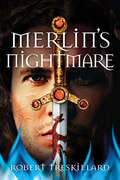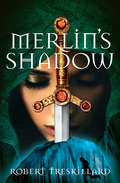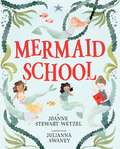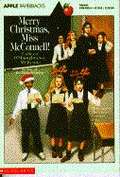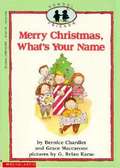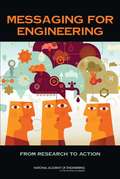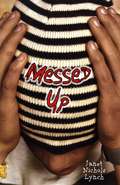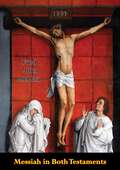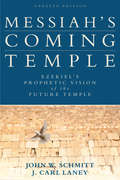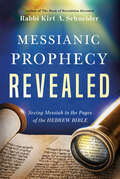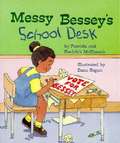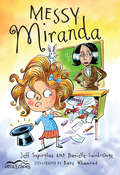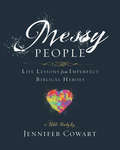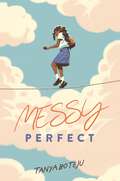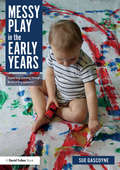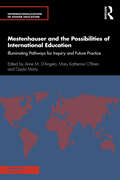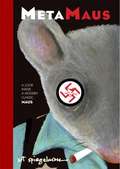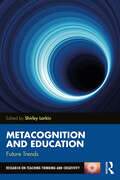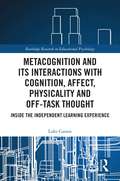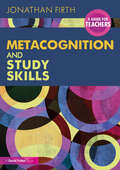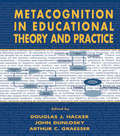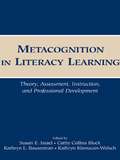- Table View
- List View
Merlin's Nightmare
by Robert TreskillardHaunted by the past, chased by the present. Arthur is now eighteen, and Merlin, tired of hiding and running from his enemies, wants nothing more than to spend his days with his family and train Arthur for his rightful place as king. But when Arthur goes missing, a desperate Merlin must abandon all other quests to find him before a shadowy pursuer catches Arthur first. Having everything to fight for, and almost nothing to fight with, Merlin and Arthur must rally Britain’s warriors against three overwhelming enemies: Saxenow hordes in the south, Picti raiders in the north, and a chilling new enemy that has arisen in the west. At the same time, Mórgana brings Merlin’s deepest fear to life and sets a horde of werewolves loose to destroy Britain. But when the secret purpose of this nightmare is finally revealed, will Merlin and Arthur find a way to survive—without unleashing an even greater evil?
Merlin's Shadow
by Robert TreskillardBetrayal. After destroying the sinister Druid Stone and freeing his people from its dark control, Merlin finds himself a royal advisor without a king. Along with his friend Garth and Natalenya, his betrothed, Merlin treks north with the orphaned Arthur in hopes of keeping the young ruler safe from soldiers misled by their turncoat captain. Relentlessly pursued by his old nemesis Vortigern, Merlin and his band make for the fortress of Dintaga. But dangers multiply when Merlin realizes that Vortigern is not his only enemy. Even his own sister appears bent on Merlin’s destruction. As the threat on all their lives increases, Merlin discovers their only hope is sailing to the lands of eternal darkness and once again cleansing the world from an ancient and powerful evil.
Mermaid School
by Joanne Stewart WetzelStarting school is always exciting... especially when you're a mermaid! From schools of fish to the A B Seas, this whimsical underwater tale puts a fun twist on what to expect on the first day of school.It's Molly's first day at mermaid school, and there's so much to learn! Follow the mermaids as they count clamshells, recite the A B Seas, and make new friends. They even enjoy story time about children who walk on land! At the end of the day, it's time to sing the goodbye song and head home. With sweet, rhyming language and a peek into a fantastical undersea world, Mermaid School touches on all the major moments children will experience on their first day. And don't miss the mermaid school handbook in the back of this book for more mermaid fun!
Mero Nepali Class 10 - Nepal
by Curriculum Centerकक्षा १० को अनिवार्य नेपाली । पाठयक्रम बिकास केन्द्र
Mero Nepali Class 7 - Nepal
by Nepal Curriculum Centerमेरो नेपाली कक्षा ७ यस पहुँचयोग्य पुस्तक अष्ट्रेलियन एडको सहयोगमा ADRAD Nepal ले तयार गरेको हो ।
Mero Nepali Class 8 - Nepal
by Nepal Curriculum Centerमेरो नेपाली कक्षा ८ यस पहुँचयोग्य पुस्तक अष्ट्रेलियन एडको सहयोगमा ADRAD Nepal ले तयार गरेको हो ।
Merry Christmas, Miss McConnell!
by Colleen O'Shaughnessy MckennaFifth-grader Meg Stafford is having a rough time getting through this Christmas season. Her father is ill and her mother is working two jobs, and her favorite teacher is on maternity leave.
Merry Christmas, What's Your Name
by Grace Maccarone Bernice Chardiet[from the back cover] "Brenda doesn't like her name. She's going to change it... to Barbie! In this book, there's a big mix-up when everyone wants a new name! With humor and warmth, the stories in the SCHOOL FRIENDS series touch on the true-to-life experiences of childhood.
Messaging for Engineering
by National Academy of Engineering Committee on Implementing Engineering MessagesFor those in the broad engineering community--those who employ, work with, and/or educate engineers, and engineers themselves--there is no need to explain the importance and value of engineering. They understand that engineers help make the world a better place for all, that they regularly grapple with important societal and environmental issues, and that the engineering process is every bit as creative as composing a symphony or crafting a piece of art. But the situation outside the engineering community is quite different. Studies have shown that most K-12 students and teachers have a limited appreciation of all the ways that engineering makes their lives better and, furthermore, that they have little understanding of what engineers do or of the opportunities that an engineering education offers. Messaging for Engineering supports efforts by the engineering community to communicate more effectively about the profession and those who practice it. This report builds on the 2008 NAE publication, Changing the Conversation: Messages for Improving Public Understanding of Engineering (CTC), which presented the results of a research-based effort to develop and test new, more effective messages about engineering. The new messages cast engineering as inherently creative and concerned with human welfare, as well as an emotionally satisfying calling. This report summarizes progress in implementing the CTC messages, but also recognizes that there is potential to galvanize additional action and thus suggests specific steps for major players in the engineering community to continue and build on progress to date. Many of the report's recommendations resulted from discussion at a December 2010 committee workshop that involved several dozen high-level decision makers representing key stakeholder groups in the engineering community.
Messed Up
by Janet Nichols LynchFifteen-year-old R.D. is repeating the eighth grade, planning to have an easy year, but after his grandmother walks out, her boyfriend is no longer able to care for him, which leaves R.D. to fend for himself while avoiding being caught.
Messiah in Both Testaments
by Fred John MeldauThis work identifies some of the major messianic prophecies of the Old Testament and shows their New Testament fulfillment in Christ.“THE MOST AMAZING DRAMA that ever was presented to the mind of man—a drama written in prophecy in the Old Testament and in biography in the four Gospels—is the narrative of Jesus the Christ. One outstanding fact, among many, completely isolates HIM. It is this: that one Man only in the history of the world has had explicit details given beforehand of His birth, life, death and resurrection; that these details are in documents given to the public centuries before He appeared, and that no one challenges, or can challenge, that these documents were widely circulated long before His birth; and that anyone and everyone can compare for himself the actual records of His life with those old documents, and find that they match one another to a nicety. The challenge of this pure miracle is that it happened concerning one Man only in the whole history of the world” (D. M. Panton).To focus attention on the unparalleled wonder of this literary miracle, think for a moment: who could have prewritten a life of George Washington or Abraham Lincoln, or any other character, five hundred years before he was born? Nowhere in any of the literature of the world, secular or religious, can one find a duplicate to the astounding miracle of the prewritten life of Christ. “The inspiration of that portrait came from the Heavenly Gallery, and not from the studio of an earthly artist” (A. T. Pierson). So amazing is this miracle of the pre-written life of Christ and its perfect fulfillment in Jesus of Nazareth that “Nothing but Divine prescience could have foreseen it, and nothing but Divine power could accomplish it.” As the full evidence is presented, all thoughtful readers will agree that “the prophecy came not in old time by the will of man, but holy men of God spake as they were moved by the Holy Spirit” (2 Pet. 1:21).
Messiah's Coming Temple: Ezekiel's Prophetic Vision of the Future Temple
by John W. Schmitt J. Carl LaneyOne of the Old Testament's most enigmatic prophecies is Ezekiel's vision of a new, restored temple in Jerusalem. What would a restored temple be like? How would it operate? And when might it be built? These and many other intriguing questions are addressed in this newly updated and expanded work based on extensive research and discussions with leading Jewish leaders and rabbis in the United States and Israel Messiah's Coming Temple provides a thorough vision of this future center of worship during the coming messianic kingdom. Along with biblical interpretation of the key prophecies of Ezekiel regarding Messiah's coming temple, the work includes photos and descriptions based on a unique and detailed model of the future temple.
Messianic Prophecy Revealed: Seeing Messiah in the Pages of the Hebrew Bible
by Rabbi Kirt SchneiderFROM THE AUTHOR OF THE BOOK OF REVELATION DECODEDThe Old Testament isn&’t just a collection of traditions from one group of people—it&’s about Jesus as the key to salvation. After reading this book, you will have no doubts that Jesus is the Messiah, and you will be able to read the Old Testament with the newfound revelation that God has been pointing to His Son as the Savior of the world for thousands of years.Many times, when inquisitive readers look to see how the New Testament authors applied the Old Testament to show that Jesus is the Messiah, they become confused. When the Gospel writers quote Old Testament scriptures and say, &“This is how Jesus fulfilled it,&” the passage quoted doesn&’t appear to be a prophecy at all. This is because understanding Messianic prophecy is often more of an art than a science. Messianic prophecy is not simply the measurement of specific prophecies about the future that Jesus fulfilled. In the Hebrew tradition, prophecy is not one-dimensional; it is not simply foretelling the future. In reality, the whole of Scripture is prophetic, pointing us to Christ. In Messianic Prophecy Revealed, Rabbi Kirt A. Schneider takes readers through the Word of God, showing them how the New Testament writers took passages out of the Old Testament to prove that Jesus is indeed the Messiah. It&’s a subject that sounds simple but is, in fact, more complex than many realize. This book will show followers of Jesus why they can have absolute confidence that Jesus is who He claimed to be—the Messiah.
Messy Bessey's School Desk (Rookie Readers)
by Fredrick McKissack PatriciaWhen Messy Bessey starts to clean up her desk at school, she inspires the rest of the class to clean up the entire room. <P><P>Lexile Measure: 580d
Messy Miranda (Orca Echoes)
by Danielle Saint-Onge Jeff SzpirglasMiranda has one messy desk. It's full of books, pencils, science projects and…other stuff. Too much stuff, says her teacher, Ms. Basil. On a family visit to her Uncle Aldo's one night, Miranda wonders if some of his magician's tools might offer a solution to her messy-desk problem. Sneaking off to the magic room, Miranda finds Uncle Aldo's impressive collection of top hats. Miranda knows that magic top hats can hold lots of things—why not the mess from her desk? At first, the hat seems to do the trick, but soon things start to go horribly wrong. As Uncle Aldo says, you have to be careful with magic. The epub edition of this title is fully accessible.
Messy People - Women's Bible Study Participant Workbook: Life Lessons from Imperfect Biblical Heroes (Messy People)
by Jennifer CowartGod can turn your messy life into a masterpiece.Every life gets messy at times. Sometimes these messes are literal, like a house that would be easier to condemn than to clean. But sometimes they are intangible messes such as illness, conflict, depression, abuse, bankruptcy, divorce, and job loss. And these messes can be painful, hurting our hearts and our homes. But as we see in the Bible, God loves to use messy people!In this six-week study, we will dig into the lives of biblical heroes who were messy people just like us but who were used by God in powerful ways. Together we will examine the stories of five wonderful but messy people and one messy parable character: Rahab, the Prodigal Son, Josiah, Mary, David, and Daniel. From their stories, we will learn how God can use broken people, restore damaged hearts and relationships, give us power to handle our critics, and help us deal with the hard moments of life. Along the way we’ll discover that we don’t have to just endure messy lives but can actually learn to thrive with God’s guidance and help. In the hands of God, our messes can become His masterpieces!The participant workbook, to be used along with the study's DVD, includes five days of lessons for each week, combining study of Scripture with personal reflection, application, and prayer.Other components for the Bible study, available separately, include a Leader Guide, and DVD with six 10-15 minute sessions.
Messy Perfect
by Tanya BotejuPerfect for fans of Mason Deaver and Becky Albertalli, this tender, raucous novel follows a rule-following, perfectionist teen who starts an underground GSA club at her conservative Catholic high school, from the acclaimed author of Kings, Queens, and In-Betweens.Cassie Perera is a star student in St. Luke's junior class. But the new school year brings an unwelcome surprise—the return to St. Luke's of Cassie's former friend, Ben, who left a few years ago after a homophobic bullying incident Cassie knows she didn't do enough to prevent.Still harboring guilt from her inaction, Cassie decides, in her usual, overzealous way, to team up with the neighboring public school to found an underground Gender and Sexuality Alliance—as a complicated strategy for making things up to Ben. Secretly, Cassie is also tempted by the possibility of opening up about her own sexuality for the first time.As Cassie’s new friends urge her out of her comfort zone, she unlocks a kind of joy and freedom she’s never felt before—even as she struggles to balance these experiences with her typical tightrope of being the perfect daughter, student, and Catholic.Cassie’s perfectly curated life unravels into turmoil, but can she embrace the mess enough to piece together something new?
Messy Play in the Early Years: Supporting Learning through Material Engagements
by Sue GascoyneCombining a rich theoretical foundation with practical tips, advice and case studies, Messy Play in the Early Years provides an informative and practical exploration of the unique qualities, characteristics and learning possibilities of messy play. Packed with valuable insights from research and theory, along with practitioner’s experiences, this accessible book will bolster readers’ understanding and appreciation of messy play and demonstrate how a range of material engagements can enhance young children’s development and learning. Exploring an array of resources and a broad spectrum of approaches, including adult-and child-led inquiry, chapters consider how the specific sensory qualities of materials encourage problem-solving, scientific thinking, creativity, self-regulation and self-expression as children discover and make sense of new phenomena. With examples of international practice and reflective questions throughout, the book highlights a variety of approaches to meeting differing time, space and budgetary needs, simplifies preparation and planning, and empowers practitioners and children to understand and use messy play effectively. An essential guidebook to supporting an engaging and rewarding journey into messy play, Messy Play in the Early Years will be an invaluable resource for early years students, practitioners and parents looking to understand and enhance children’s learning possibilities.
Mestenhauser and the Possibilities of International Education: Illuminating Pathways for Inquiry and Future Practice (Internationalization in Higher Education Series)
by Anne M. D’Angelo, Mary Katherine O’Brien, and Gayla MartyFocusing on the work of Josef A. Mestenhauser (1925–2015) and the depth and breadth of his contribution to the area of internationalization of higher education, this book addresses the theoretical foundations of the field of international education and the implications for practice and strategy. It considers key concepts and poses questions for discussion that make Mestenhauser’s work accessible to new readers. Through a series of provocative essays, contributors to this volume examine Mestenhauser’s influence on their understanding and practice of international education, the relevance of his work today, the transferability of his ideas across contexts, and current interpretations of the field. They consider areas of agreement and disagreement that illuminate pathways for inquiry and future practice, affirming the importance of his work in a new global landscape. Mestenhauser and the Possibilities of International Education is suitable reading for all those interested in the internationalization of higher education, including higher education faculty, students, researchers, and international education and higher education policy makers.
MetaMaus: A Look inside a Modern Classic, Maus
by Art SpiegelmanMETAMAUS is built around a series of taped conversations with Hillary Chute. (She is currently Neubauer Family Assistant Professor in the English Department at the University of Chicago and was previously a Junior Fellow in Literature in the Society of Fellows at Harvard University.)
Metacognition and Education: A Practical Guide For Teachers (Research on Teaching Thinking and Creativity)
by Shirley LarkinMetacognition is crucial to education in a changing world. The role of mobile applications, AI and global issues such as climate change make the need for developing learners with the ability to monitor and control their own thinking increasingly necessary. Metacognitive learners are learners who can draw on their own knowledge of their own thinking processes to optimise the conditions under which they learn best. Metacognitive learners are self-regulating and pro-active in motivating themselves to learn new skills. Metacognitive learners are strategic in terms of managing their own resources to get the best from every learning opportunity and to transfer that knowledge to new areas of work. This book is timely in demonstrating how metacognition research is addressing issues of importance in future education. The chapters are authored by an international group of scholars from four continents, who are experts in the field of metacognition and self regulation research. Drawing on their years of experience they look to the future to suggest the future trends in metacognition research. At the same time chapters are rooted in practical application and suggest ways in which the research can be translated into educational environments. The book addresses some new areas of metacognition research such as mind wandering as well as established areas such as teacher metacognition. We are also reminded to consider the social interactions between students and others and the role that relationships play in developing metacognition. Both researchers and educators of all types will find something of interest here. The book sets the trend for future trends in metacognition research.
Metacognition and Its Interactions with Cognition, Affect, Physicality and Off-Task Thought: Inside the Independent Learning Experience (Routledge Research in Educational Psychology)
by Luke CarsonWhat happens when teachers are removed from the equation, when we learn by ourselves or with peers? Increasingly rapid change is part of our world today and tomorrow. The need to learn and to adapt is now lifelong and ubiquitous. But are educators and educational institutions preparing today’s students for this reality? Educators and institutions choose pedagogic models, design curricula and provide instruction. However, this does not mirror the learning environments that we inhabit outside of formal education, nor does it reflect all our learning time during formal education. This text provides a data-driven picture of the independent learning experience – what occurs in the minds of learners as they negotiate learning tasks without (or with less) guidance and instruction. Cognition, distraction, embodied experience, emotion, and metacognition are central to this learning. Drawing on new empirical data, this volume focuses on university-aged learners. These are the learners who have been through our formal educational systems. Do they learn well in independent settings? Have they been prepared for this? Through an explication of this experience, this volume makes a case for how we can better prepare them for the demands of current and future learning.
Metacognition and Study Skills: A Guide for Teachers
by Jonathan FirthPupils often make poor choices when it comes to independent learning because they don’t intuitively understand how to learn. In the classroom too, they typically misjudge how well they understand new concepts, overestimate the accuracy of their own examples and underestimate how much they forget. This book reveals how a metacognitive approach to teaching can help overcome these challenges and support pupils in their learning. This approach can help them in developing the skills to become successful, self-regulated learners.Drawing on key research from cognitive science, this book explores how metacognition works in practice and argues that it is a complex skill best developed over months and years at school. It provides a blueprint for how ‘learning to learn’ alongside ‘quick wins’ that teachers can implement straight away. Chapters cover: • The metacognitive processes that underpin effective learning• Myths about learning, and how pupils’ memory really works• Quick-to-apply classroom strategies for before, during, and after tasks• Different independent study techniques and how to embed them• Developing a culture of metacognitionFull of practical strategies and case studies, this is essential reading for all teachers who want to help their pupils become successful learners in school as well as independent learners for their exam revision and beyond.
Metacognition in Educational Theory and Practice (Educational Psychology Series)
by Arthur C. Graesser John Dunlosky Douglas J. HackerThis volume presents the most current perspectives on the role of metacognition in diverse educationally relevant domains. The purpose is to examine the ways in which theoretical investigations of metacognition have recently produced a strong focus on educational practice. The book is organized around four general themes relevant to education: metacognition and problem solving, metacognition and verbal comprehension, metacognition and the education of nontraditional populations, and metacognition and studentship. Chapter authors review current literature as it applies to their chapter topic; discuss theoretical implications and suggestions for future research; and provide educational applications. Each chapter describes testable theory and provides examples of how theory can be applied to the classroom. The volume will have wide appeal to researchers and students concerned with the scientific investigation of metacognition, and to practitioners concerned with the cultivation of learning and achievement in their students. The unique contribution of this book to the literature on metacognition is its presentation of the most current research examining specific theoretical aspects of metacognition in domains directly relevant to education. This is especially valuable for the many researchers and practitioners who subscribe to the concept that by fostering metacognitive processes during instruction, more durable and transferable learning can be achieved.
Metacognition in Literacy Learning: Theory, Assessment, Instruction, and Professional Development
by Cathy Collins Block Kathryn L. Bauserman Susan E. Israel Kathryn Kinnucan-WelschThis volume provides the first comprehensive, research-based examination of metacognition in literacy learning. Bringing together research findings from reading, linguistics, psychology, and education, it is logically organized as follows: Part I provides the theoretical foundation that supports the teaching of metacognition; Parts II and III provide new methods for metacognitive assessment and instruction in literacy contexts at all grade levels; and Part IV provides new information on integrating metacognition into professional development programs.Key features include:*Chapter Structure. Teacher reflections at the beginning of each chapter illustrate teacher thinking about the chapter topic and metacognitive connections at the end of each chapter link its content with that of the preceding and following chapters.*Contributor Expertise. Few volumes can boast of a more luminous cast of contributing authors (see table of contents).*Comprehensiveness. Twenty chapters organized into four sections plus a summarizing chapter make this the primary reference work in the field of literacy-based metacognition.This volume is appropriate for reading researchers, professional development audiences, and for upper-level undergraduate and graduate level courses in reading and educational psychology.
